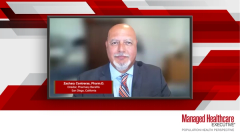
Reducing Clinical Resource Burden: Impact of Less Frequent NMIBC Therapy Administration
An expert discusses how less frequent administration of therapies like nadofaragene (every 90 days) significantly reduces clinical resource burden compared with combination treatments like gemcitabine-docetaxel, which require extensive logistics, chemotherapy-licensed staff and daily clinic visits.
Episodes in this series

Video content above is prompted by the following:
The frequency of therapy administration significantly impacts clinical resource utilization across different non-muscle invasive bladder cancer (NMIBC) treatment options. Gemcitabine and docetaxel combination therapy represents the most resource-intensive approach, requiring patients to spend most of the day in clinic for sequential drug administration. This treatment places substantial demands on chair time, staffing and facility resources, while also presenting reimbursement challenges that can create negative margins for some practices.
Nadofaragene demonstrates superior operational efficiency with its every-90-day dosing schedule, though it presents unique logistical challenges. The medication requires several hours of thawing time, initially creating concerns about potential loss of expensive medication due to patient no-shows or scheduling conflicts. However, industry partner programs now provide medication replacement for legitimate scheduling conflicts, reducing financial risk and improving operational flexibility.
The coordination of cystoscopy visits with gene therapy administration optimizes resource utilization and patient convenience. Patients can complete their surveillance cystoscopy in the morning and receive their gene therapy treatment in the afternoon during the same campus visit. This scheduling efficiency reduces travel burden for patients while ensuring physical presence before administering expensive medications. The contrast between weekly administration requirements and quarterly dosing schedules demonstrates how treatment frequency directly impacts both clinical resources and patient quality of life.
Newsletter
Get the latest industry news, event updates, and more from Managed healthcare Executive.


























